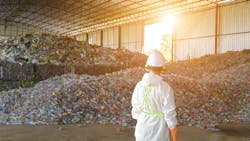Recycling Plant Uses Superheated Water to Tackle Plastic Waste
According to a recent article in Nature, the world only recycles 10-15% of its plastic waste, largely due to difficulties in sorting and cleaning mixed, contaminated plastics. A new chemical recycling plant in northeast England, operated by Mura Technology, offers a potential solution by using high-temperature water to break down various plastics into chemical building blocks. This process is claimed to be more efficient and environmentally friendly than traditional pyrolysis methods. However, the plant still requires pre-sorted waste, and not all products can be turned back into plastic.
Chemical recycling methods for plastics include depolymerization (using solvents or enzymes) and pyrolysis (heating without oxygen). While pyrolysis is becoming more common, with about 50 plants worldwide, it has significant drawbacks: inefficiency, char production, and requiring clean, sorted waste. Mura Technology's new approach uses supercritical water at high temperatures and pressure to break down plastics more effectively. This hydrothermal liquefaction process, developed from earlier biomass conversion research, promises higher efficiency and better contamination tolerance than pyrolysis.
Mura Technology's hydrothermal plastic recycling technology (Hydro-PRT) evolved from a biomass processing system, with $200 million in development funding from companies like Dow and KBR. The process takes 30 minutes to convert plastic into various hydrocarbon products, which are then used for making new plastics or other materials. While Mura claims to process only waste rejected by mechanical recyclers, they still require sorted polyolefin plastics to produce desired outputs. A life-cycle analysis shows the process emits about half a ton of CO2 per ton of plastic processed, mainly from electricity usage for sorting and heating.
“I would love to think that because we’re putting more recycling technologies into the world, crude-oil production for polymeric materials is going to drop. That hasn’t happened yet: polymer production from crude oils has gone up year on year since forever,” said Stuart Coles, a sustainability researcher in the Warwick Manufacturing Group (WMG) at the University of Warwick, UK, in the Nature article. “But it’s not going to go the other way unless we can find ways to get the material that we’ve already got back into our system.”
Mura’s UK plant will process roughly 23,000 tons of waste per year, and similar Hydro-PRT plants are planned in Germany, the United States, Singapore, Japan and South Korea, some of them under license to other companies, including Mitsubishi and LG Chem. Mahon says that the UK plant will be a crucial test bed for the technology that will guide the development of future factories.
About the Author
Traci Purdum
Editor-in-Chief
Traci Purdum, an award-winning business journalist with extensive experience covering manufacturing and management issues, is a graduate of the Kent State University School of Journalism and Mass Communication, Kent, Ohio, and an alumnus of the Wharton Seminar for Business Journalists, Wharton School of Business, University of Pennsylvania, Philadelphia.

